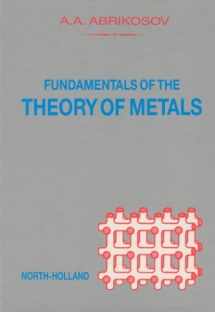
Fundamentals of the Theory of Metals
ISBN-13:
9780444870940
ISBN-10:
0444870946
Author:
A. A. Abrikosov
Publication date:
1988
Publisher:
North Holland
Format:
Hardcover
630 pages
FREE US shipping
Book details
ISBN-13:
9780444870940
ISBN-10:
0444870946
Author:
A. A. Abrikosov
Publication date:
1988
Publisher:
North Holland
Format:
Hardcover
630 pages
Summary
Fundamentals of the Theory of Metals (ISBN-13: 9780444870940 and ISBN-10: 0444870946), written by authors
A. A. Abrikosov, was published by North Holland in 1988.
With an overall rating of 4.2 stars, it's a notable title among other
books. You can easily purchase or rent Fundamentals of the Theory of Metals (Hardcover) from BooksRun,
along with many other new and used
books
and textbooks.
And, if you're looking to sell your copy, our current buyback offer is $0.3.
Description
``Fundamentals of the Theory of Metals'' has grown out of courses and lectures given by the author over a period of years. Part I is devoted to normal metals and is basically a thoroughly revised version of the author's book ``An Introduction to the Theory of Normal Metals'', originally published in Russian in 1972. It covers the electronic spectra of metals, electrical and thermal conductivities, galvanomagnetic and thermoelectrical phenomena, the behaviour of metals in high-frequency fields, sound absorption and Fermi-liquid phenomena. Part I also deals with the present-day concept of the energy spectra of electrons in metals and with methods that make it possible to study the behaviour of metals in dc and ac fields. Part II is concerned with the theory of superconductivity and offers a detailed description of two fundamental methods: the microscopic theory based on the Bogoliubov method and the Ginzburg-Landau theory, which allows the description of the behaviour of superconductors close to the critical temperature. ``Fundamentals of the Theory of Metals'' is intended for undergraduate students majoring in physics and also for graduate and postgraduate students, research workers and teachers. The presentation presumes a knowledge of quantum mechanics and quantum statistics, but no special knowledge of metals that goes beyond the course of general physics is needed.


We would LOVE it if you could help us and other readers by reviewing the book
Book review

Congratulations! We have received your book review.
{user}
{createdAt}
by {truncated_author}


